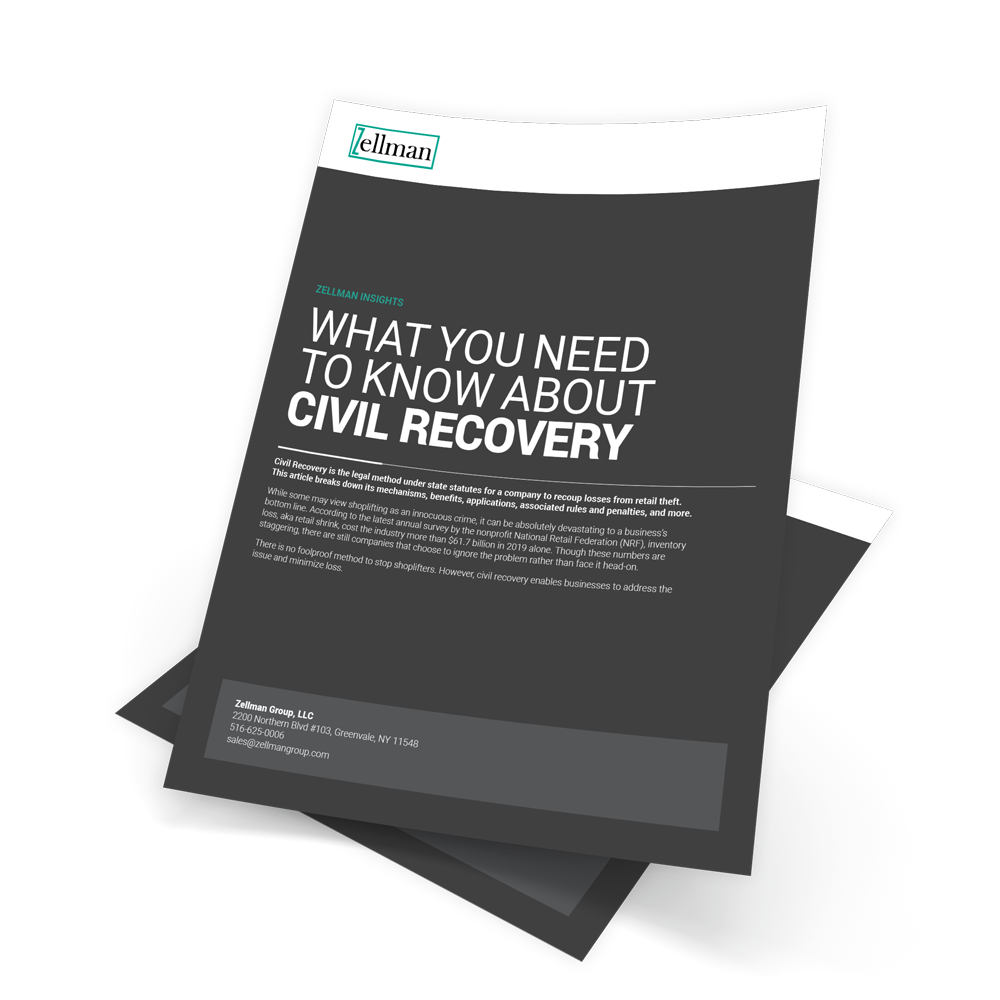While some may view shoplifting as an innocuous crime, it can be absolutely devastating to a business’s bottom line. According to the latest annual survey by the nonprofit National Retail Federation (NRF), inventory loss, aka retail shrink, cost the industry more than $61.7 billion in 2019 alone. Though these numbers are staggering, there are still companies that choose to ignore the problem rather than face it head-on.
There is no foolproof method to stop shoplifters. However, civil recovery enables businesses to address the issue and minimize loss.
What Is Civil Recovery?
Based on tort law, civil recovery is a legal method to regain monetary damages resulting from a crime. In retail theft cases, the process typically begins with a civil demand letter issued to offenders for expenses resulting from their alleged actions. If they do not pay, the retailer may send follow-ups demanding even more restitution. Should these remain unsuccessful, the business may choose to either drop the case or pursue it in civil court.
Many confuse civil recovery attempts with debt collection, but in truth, these are two very distinct processes governed by different laws and statutes. As a Loss Prevention Magazine article reports, the courts, U.S. Congress, and Federal Trade Commission (FTC) have definitively established that the federal Fair Debt Collection Practices Act (FDCPA) does not apply to civil settlement attempts related to tort claims.
Civil Demand is state statute driven, and all 50 U.S. states and the District of Columbia have civil shoplifting regulations. Most permit recovery of damages, attorney’s fees, and a civil penalty. The latter is meant to reimburse retailers for the costs associated with their loss prevention programs.
Civil Demand varies by state, with three main methods of calculation: as a multiple of the stolen merchandise’s retail worth, a predetermined cap indeterminate of its value, or a specific fine dependent upon its cost.
State statutes also vary with regard to whether a demand letter and/or conviction are required for civil action, and the extent to which a parent is financially liable for the actions of a minor.
Ultimately, the total restitution will be determined by either a court order or a repayment agreement between the accused shoplifter and the retailer.
While many companies pursue civil recovery in lieu of criminal charges, these are not mutually exclusive. A retailer may press charges, seek civil recovery, and/or attempt justice through both methods.
What Types of Cases Exist?
Civil Demand
With Civil Demand, the retailer issues a letter requesting a sum of money for costs associated with the incident. If the recipient does not pay after the first request, subsequent letters may demand higher totals.
Restitution
Restitution is money to compensate victims for their losses. Suspected shoplifters may agree to an amount as part of a plea deal. Negotiating reasonable restitution with the suspected shoplifters can end the case more quickly and make you appear fair and ethical.
Court-Ordered Restitution
When the parties can not come to an agreement, the court may order restitution to repay the victim for financial losses.
What Kind of Businesses Can Benefit From Civil Recovery?
Any company that may fall victim to theft stands to gain by implementing a civil recovery program. While shoplifting may be one of the best-known types of retail theft, coupon fraud, return fraud, employee theft, and vendor fraud are others.
The following industries frequently qualify:
- Retail
- Food Service
- Hospitality
- Themed/Amusement/Animal Parks
- Theaters
What Do You Need to Consider Before Pursuing Civil Recovery?
State Statutes
Civil recovery is governed by state statutes that dictate requirements, recovery limits, and more. Retailers attempting civil recovery must be aware of their legal rights and responsibilities to stay in compliance.
Cost-Effectiveness
While retailers may be able to recoup losses and help fund their loss prevention measures through civil recovery, this will depend on the state regulations. Before initiating the process, retailers should weigh their potential gains and losses. For those who lack an in-house legal team and are based in a state that does not allow for the recovery of attorney fees, seeking civil recovery for low-value shoplifting incidents could cost more than it brings in.
Moral & Societal Obligations
Even if civil recovery is not ideal for your business financially, adopting a zero-tolerance policy to shoplifting could be seen as a moral and societal obligation. This can nudge shoplifters down a better path, and ultimately, help the retail industry as a whole.
Criminal Charges
Some states require that criminal charges be filed for retailers to pursue civil recovery, but most treat these two options as separate entities. Whether a business attempts one or both may depend on the severity of the crime and the extent to which they want suspected shoplifters to pay for their actions.
Why Is Civil Recovery a Good Business Decision?
Reduce Recidivism
Civil recovery may also reduce the likelihood that a casual shoplifter will reoffend. Not only does it hold them accountable for their actions, but serves as a strong financial deterrent. If they ultimately pay $100 for pocketing a $1 candy bar, for example, repeating the offense may not seem worth the risk.
Recoup Losses
Most civil recovery statutes enable retailers to retrieve the proceeds of the crime, in addition to penalties and attorney fees. Businesses can therefore recoup the value of the stolen property, while helping fund their loss prevention program to help avert future cases.
Support Your Industry
Theft hits the retail industry hard. While it may be tempting to view the associated losses as the cost of doing business, this approach could simply embolden shoplifters to continue stealing from both you and your competitors. Not only could civil recovery be a wise business decision for your organization, but it could also help your industry thrive.
The Benefits of Outsourcing Civil Recovery to Experts
Your in-house team can send civil demand letters and take the case to civil court if necessary, or you can transfer the work over to recovery experts. These two approaches differ significantly in the following aspects:
- Expertise: Few retailers have in-house teams with the level of expertise necessary to seamlessly navigate the civil recovery process across all 50 states and the District of Columbia. Skilled civil recovery firms know the statutes, enabling them to follow the letter of the law across jurisdictions.
- Convenience: The civil recovery process can be time consuming and stressful. Outsourcing is convenient, and enables your staff to focus on other duties.
- Investigation: The best civil third-party civil recovery solutions can also provide valuable investigation services. These may be especially valuable when organized retail crime is involved.
- Advice: Because of their extensive experience and expertise, civil recovery firms are well equipped to provide guidance on the best course of action, whether issuing demand letters or taking the case to civil court.
- Reputation: Having a third-party handle your civil recovery protects your reputation, shielding your company from any ill will or retribution from recipients of demand letters and associated actions.
Why Is Zellman Civil Recovery a Good Business Decision?
The Zellman Group’s civil recovery is attorney-led. Our network of experienced lawyers spans all 50 states to help our clients navigate the pertinent laws of their areas. We hold a risk-averse philosophy and use cutting-edge technology to make the civil recovery experience more user friendly. Live representatives place our calls, and each outbound letter is produced in our state-of-the-art mailroom.
With so many laws in place, doing your civil recovery in-house could open you up to liability if your team lacks the expertise to comply with all regulatory guidelines. Since The Zellman Group is an industry leader, we know the ins and outs of the applicable statutes so that we can help you recover your losses without opening you up to unnecessary risks. Contact us to schedule a demo today.






